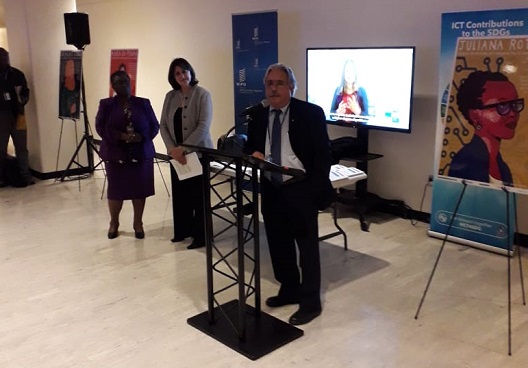Fiocruz participates in UN STI Forum for 2030 Agenda
21/06/2019
Julia Dias
Between May 14 and 15, the UN headquarters in New York hosted the UN's Science, Technology and Innovation Forum for the Sustainable Development Goals (STI Forum). Fiocruz was represented by the coordinator of the Fiocruz Strategy for 2030 Agenda (EFA 2030), Paulo Gadelha, and his team. The Forum is part of the mandate of the UN Technology Facilitation Mechanism (TFM), in which Gadelha is a member of the Group of Ten.

The event brought together multiple stakeholders, including representatives from the UN, governments, scientists and the private sector, to identify and examine the needs and gaps in technology for the implementation of 2030 Agenda. Scientific cooperation, innovation and capacity building, as well as the facilitation of development, transfer and dissemination of technologies relevant to sustainable development were some of the topics discussed.
The agenda of Gadelha and his team included some STI Forum satellite events: the Global Solutions Summit 2019 (GSS 2019), which preceded the Forum on May 13, and G-STIC (Global Sustainable Technology and Innovation Conference Series) on the 16th.
In the G-STIC event, the coordinator of EFA 2030 presented the Wolbachia project. Wolbachia is a bacterium that, when present in the organism of the Aedes aegypti mosquito, has the capacity to reduce the transmission of arboviruses such as dengue, chikungunya, zika and yellow fever. The development of the technology is supervised by Fiocruz researcher and leader of the World Mosquito Program (WMP) in Brazil, Luciano Moreira. The WMP is an international program to fight diseases transmitted by mosquitos and, in Brazil, it is conducted by the Foundation.
G-STIC Director, Veerle Vandeweerd, spoke at two satellite events on the importance of facilitating the scaling-up of inclusive and sustainable technologies in the market to contribute to the achievement of the Sustainable Development Goals (SDG). G-STIC is seen as a platform that brings together governments, investors, scientists and civil society for this purpose. She mentioned the presence of Fiocruz, co-host of G-STIC, as an important supporter of all these initiatives.
"Even if existing sustainable and inclusive technologies are scalable, without investment it is not possible to guarantee access to all. We must then think strategically about how to implement these technologies. G-STIC came about for this purpose”, explained Vandeweerd.
The former president of Fiocruz also participated in the launch event of the exhibition "Women in Science, Technology and Innovation", organized by UN Women, on May 14. The exhibition featured posters of women who have strongly influenced world science.
"By taking the lead in the field of science, women have brought a new perspective. Not only for enriching scientific achievement, but also for thinking about issues that had not been suggested until then", said Paulo Gadelha, acknowledging the fundamental importance of women's participation in the scientific process and reinforcing the commitment of Fiocruz and the Group of Ten to foster their greater involvement in this field.
On the same day, the panel “The digital revolution and Sustainable Development: Opportunity and Challenges” took place, organized by The World In 2050 initiative (TWI 2050). Gadelha shared the panel with other members of the Group of Ten and brought up some health challenges in this context: "When we think of digital and technological revolution, health is a key area. Either technologies emerge from the area of health, or the technologies have a major impact on the area of health".
On April 15, the EFA 2030 team, together with the other members of the Group of Ten, attended a round table for the development of Roadmaps for science, technology and innovation for SDG from a technical perspective. The event discussed the work of the UN and its collaboration for the development of a guide for Member States on the construction of Roadmaps as a communication and public policy building tool. The session also presented a global proposal for the Science, Technology and Innovation Pilot Roadmap for SDG to prepare and scale up its adoption by Member States.


